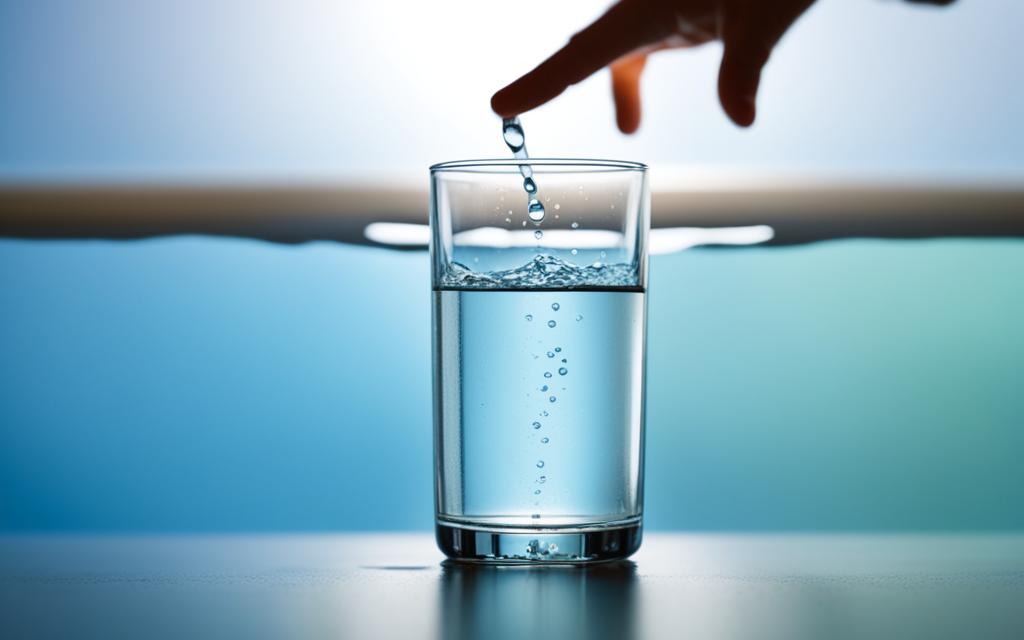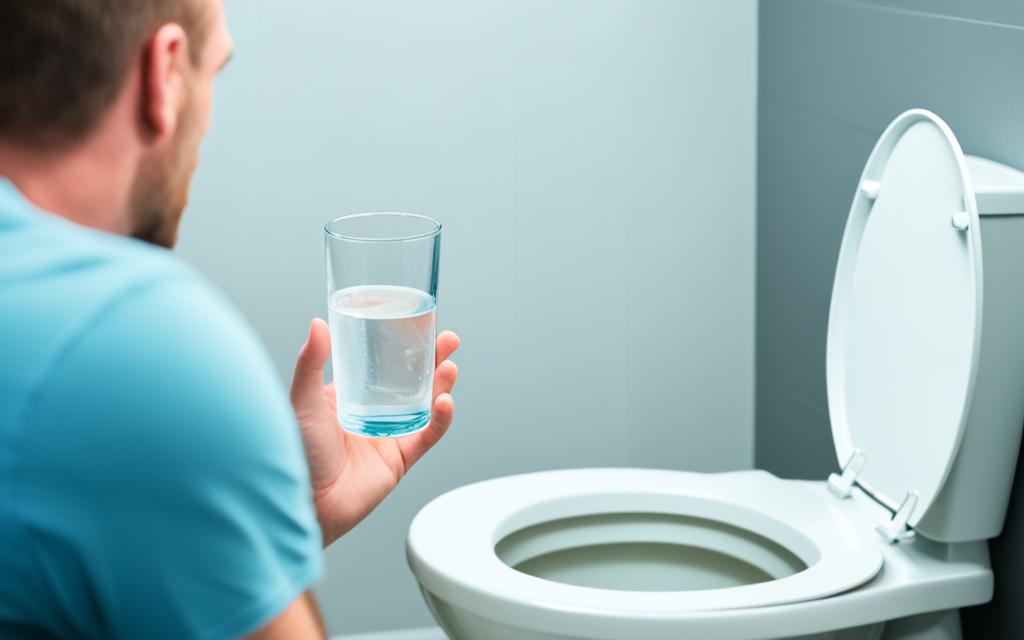Experiencing vomiting can be a distressing and uncomfortable situation. It often leaves us feeling weak and depleted. One question that may come to mind is whether drinking water after throwing up is advisable. In this article, we will explore the importance of rehydration after vomiting and whether water intake is recommended for a speedy recovery.
Key Takeaways:
- After vomiting, it is crucial to replenish lost fluids and electrolytes to prevent dehydration.
- Timing is key – it is recommended to wait for 15-30 minutes before drinking water after throwing up.
- Pay attention to signs of dehydration like dry mouth, decreased urine output, or fatigue.
- In addition to water, consider alternative fluids like electrolyte solutions or clear broths to rehydrate your body.
- Drinking water supports overall health and aids in the recovery process after vomiting.
Hydration After Vomiting
After vomiting, the body loses fluids and electrolytes, which can lead to dehydration. It is crucial to replenish these fluids to maintain optimal health and well-being.
Drinking fluids after vomiting is essential for rehydrating the body and restoring electrolyte balance. Water is the most basic and readily available option for hydration. It helps restore the lost fluids and flush out any remaining toxins in the stomach.
However, if the vomiting was severe or prolonged, simply drinking water may not be enough. Rehydrating after throwing up may require a combination of fluids and electrolytes. Options like sports drinks, coconut water, and clear broths can provide additional electrolytes and minerals that the body needs.
It’s important to note that when choosing fluids, it’s best to avoid acidic or sugary beverages as they can further irritate the stomach. Opt for clear fluids that are gentle on the stomach, especially in the early stages of recovery.
It’s recommended to start with small sips of fluids and gradually increase intake as tolerated. If you experience difficulty keeping fluids down or show signs of persistent dehydration, it’s advisable to seek medical attention.
Comparison of Fluids for Rehydration
| Fluid Option | Benefits | Considerations |
|---|---|---|
| Water | Basic and easily accessible | May not provide adequate electrolytes |
| Sports drinks | Contains electrolytes for quick recovery | May contain added sugars or artificial flavors |
| Coconut water | Natural source of electrolytes | May not be readily available |
| Clear broths | Provides essential nutrients and electrolytes | May not appeal to everyone’s taste |
Remember, hydration after vomiting is crucial for restoring the body’s fluid balance. It aids in recovery and prevents further complications. Pay attention to your body’s cues and consult a healthcare professional if you have concerns about rehydrating effectively.
When to Drink Water After Vomit
Timing is key when it comes to drinking water after throwing up. It is crucial to replenish the fluids lost during vomiting to prevent dehydration and aid in the body’s recovery process. While there is no one-size-fits-all answer to when exactly you should drink water after vomit, there are some general guidelines to keep in mind.
The recommended timeframe for rehydration after vomiting is typically within the first 30 minutes to an hour. This allows the body to replace lost fluids and electrolytes promptly.
Signs that indicate your body needs fluids:
- Feeling thirsty or dry mouth
- Dry, sticky skin
- Dark yellow urine or decreased urine output
- Headache or dizziness
- Fatigue or weakness
However, every individual is unique, and the severity of vomiting and individual factors may affect the recommended timeframe for rehydration. If you are unsure or have any concerns, consult a healthcare professional for personalized advice.

| Severity of Vomiting | Recommended Timeframe for Rehydration |
|---|---|
| Mild to Moderate | Within 30 minutes to an hour |
| Severe or Prolonged | Immediate medical attention may be necessary |
Replenishing Fluids After Vomiting
When you vomit, your body loses essential fluids and electrolytes, which can lead to dehydration. Rehydrating is crucial for your health and recovery. While water is the go-to choice, there are other fluids you can consume to replenish what you’ve lost.
One option is electrolyte drinks, such as sports drinks or rehydration solutions, that contain a balanced mix of electrolytes to help restore hydration levels. These drinks are particularly beneficial if you’ve been vomiting excessively or experiencing diarrhea. They can help replace both fluids and electrolytes.
Another option is clear broths, such as chicken or vegetable broth, which can provide both hydration and nourishment. The warm broth can be soothing to your stomach and provide essential nutrients to your body.
Additionally, herbal teas like ginger tea or chamomile tea can aid in replenishing fluids and provide added benefits. Ginger tea can help soothe your digestive system, while chamomile tea can have a calming effect on your body.
It’s important to choose fluids that are easy on your stomach and won’t aggravate any nausea or vomiting. Start with small sips and gradually increase your intake as tolerated. If you continue to vomit or experience severe symptoms, consult a healthcare professional for proper guidance.
Remember, replenishing fluids after vomiting is crucial for your body’s recovery. Choose the fluids that work best for you and listen to your body’s needs. Stay hydrated and prioritize your well-being.
Comparison of Fluid Options for Rehydration
| Fluid Options | Benefits | Considerations |
|---|---|---|
| Water | Simple and easily accessible | May not contain electrolytes |
| Electrolyte drinks | Helps replace fluids and electrolytes | May contain added sugars or artificial ingredients |
| Clear broths | Provides hydration and nourishment | May not be suitable for individuals with dietary restrictions |
| Herbal teas | Offers hydration and potential additional benefits | May have individual sensitivities or interactions with medications |
The Importance of Water After Throwing Up
Water is an essential element for maintaining overall health, and its significance becomes even more evident after experiencing vomiting. When you vomit, your body loses significant amounts of fluids and electrolytes, which can lead to dehydration. Replenishing these lost fluids through adequate water intake is crucial for promoting recovery and restoring your body’s balance.
Drinking water after throwing up offers numerous benefits to support the healing process. Firstly, water helps in rehydrating your body, restoring moisture to cells and tissues. This rehydration is necessary for maintaining optimal organ function and overall well-being.
Additionally, water facilitates the elimination of toxins from your system. Vomiting can disrupt the digestive process, causing the release of unwanted substances. By drinking water, you assist your body in flushing out these toxins, aiding in detoxification and promoting a healthy gastrointestinal system.
Furthermore, water plays a crucial role in preventing further dehydration. When you vomit, the body expels not only fluids but also essential electrolytes like sodium, potassium, and chloride. Replenishing these electrolytes is vital to restore the balance necessary for the proper functioning of your cells and organs.
| Benefits of Water After Throwing Up |
|---|
| Rehydrates the body |
| Aids in the elimination of toxins |
| Prevents further dehydration |
Drinking water after vomiting also helps in soothing the digestive system. It can alleviate stomach discomfort and irritation, promoting a faster recovery and reducing the risk of further complications.
To ensure proper rehydration, it is essential to drink water in regular intervals, sipping slowly rather than consuming large amounts all at once. This method allows your body to better absorb and utilize the water, maximizing its benefits for your recovery.
Safely Rehydrating After Throwing Up
While replenishing fluids is essential, it is important to do so in a safe and gradual manner. After vomiting, your body needs time to recover and adjust. Here are some tips to help you safely rehydrate after throwing up:
1. Start with Small Sips
Instead of gulping down large amounts of water at once, start by taking small sips. This will prevent overwhelming your stomach and minimize the risk of further irritation.
2. Use Electrolyte Solutions
In addition to water, consider using electrolyte solutions to replenish lost electrolytes. These solutions help restore the balance of essential minerals in your body.
3. Gradually Increase Fluid Intake
As your body begins to adjust, slowly increase your fluid intake. Start with small, frequent sips and gradually build up to larger quantities.
4. Avoid Sugary or Carbonated Drinks
While it may be tempting to reach for sugary or carbonated beverages, it’s best to avoid them. These drinks can further irritate your stomach and hinder the rehydration process.
5. Listen to Your Body
Pay attention to your body’s cues and drink water when you feel thirsty. If you experience any discomfort or worsening symptoms, consult a healthcare professional for further guidance.
| Advantages | Disadvantages | |
|---|---|---|
| Small Sips | – Minimizes stomach irritation – Easier to tolerate |
– May require more time to rehydrate |
| Electrolyte Solutions | – Replenishes lost electrolytes – Supports hydration |
– May have a strong taste or aftertaste |
| Gradual Fluid Intake | – Allows your body to adjust – Reduces the risk of overhydration |
– Requires patience and self-monitoring |
| Avoiding Sugary or Carbonated Drinks | – Prevents further stomach irritation – Promotes healthy hydration |
– Limits beverage options |
| Listening to Your Body | – Helps identify hydration needs – Ensures personalized rehydration |
– Requires self-awareness and monitoring |
Conclusion
Drinking water after throwing up is essential for rehydration and promoting the recovery process. When you vomit, your body loses fluids and electrolytes, which can lead to dehydration. By replenishing these vital elements, you can maintain your health and well-being.
However, it is crucial to pay attention to your body’s cues and consult with a healthcare professional if necessary. While drinking water is generally recommended, individual circumstances may vary, and professional guidance can provide personalized advice.
Remember, rehydration after vomiting is a priority for your overall health. Water plays a vital role in restoring hydration levels and aiding in the body’s recovery. Listen to your body, and prioritize replenishing lost fluids to ensure a swift and healthy recovery.



